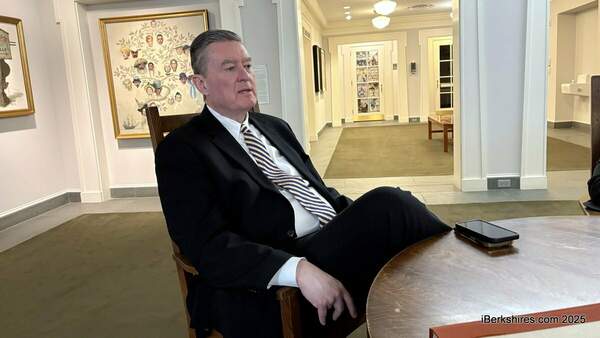
MassDOT Board Hears From Local Leaders
 MassDOT board Chairman John R. Jenkins, left, and Secretary Richard A. Davey listen during a meeting of the board at City Hall on Wednesday. |
Easier commuting within the county as well as transportation from without by bus, rail and air were stressed as critical factors in the western-most county's economic development.
"We have a plan, we've submitted our vision to the state, we have a budget behind it," Berkshire Regional Transit Authority Administrator Gary Shepard told the MassDOT board on Wednesday afternoon. "I believe with the right plan in place, we can easily increase ridership by over 30 percent ... and play a greater role in economic development."
Shepard said some 65 percent of county residents have no car; 85 percent of those use the bus on weekly basis to get to work, school and medical appointments (some 1.2 million). Ridership is up overall, especially wheelchair and bicycle riders.
But, he said, the BRTA's limited day hours and six-day-a-week schedule means those working later shifts and Sundays, a seventh-day critical in the culturally focused Berkshires, can't get where they need to go - or get home when they're done.
Worse, commuting from Williamstown to Great Barrington was equal to flying from Logan to Heathrow, he said, which doesn't help a growing service economy or support the industrial parks.
"Our economy is based on that," he said. "We look at ourselves not as much as a transportation agency than as an economic tool."
State Rep. Tricia Farley-Bouvier, D-Pittsfield, repeated a previous complaint that the county sends far more to the Massachusetts Bay Transit Authority than it gets back in return.
She considered taking the bus to make a point but said she'd have to walk two miles from her home to get to a bus stop for 10 — to make the 1 p.m. meeting in North Adams. With no way back after an evening event here.
"I'm only in Central Berkshire, but buses are very, very difficult," she said. "In Boston, I'm able to get around that city 18 hours a day. ...
"For every dollar [Berkshire County residents] spend on the MBTA through our pennies on the sales tax, we get 7 cents back — 7 cents on the dollar. And by anybody's estimation that's one bad investment."
Mayor Daniel Bianchi recalled how House Speaker Robert DeLeo had been surprised to see horses so close to a town center when he'd visited a few months back. Bianchi joked that he nearly had him convinced they were integral to the Berkshires' transportation.
Chairman John R. Jenkins laughed that he saw the same horses and thought, "we've got to do something to help them with their transportation."
The MassDOT board was holding its second meeting since expanding from five members to seven through legislation passed in July, and its first in North Adams.
They were welcomed to City Hall by Mayor Richard Alcombright who expressed his appreciation to the board of the work MassDOT has done on projects around the city, including the airport and the Sacco Bridge and most especially the massive effort in reopening Route 2 after Hurricane Irene.
"Whenever I speak about the DOT, I lead with that," said Alcombright. "It might have been a couple years before our major connector to the east could have been opened."
.jpg) |
 |
| BRTA head Gary Shepard urged greater investment in Berkshires' transit system as an economic tool; Janice Loux of Williamstown said she would be a voice for Western Mass. | |
He pointed to Pittsfield's new Upstreet Cultural District, one of only 15 in the state, and credited MassDOT in large part because of the investment it had done in the downtown area.
Also speaking were Pittsfield Municipal Airport Manager Mark Germanowski, who touched on nearly completed airport project; James Stakenas of Massachusetts College of Liberal Arts, who pointed to the importance of public transportation for students and their parents; and citizen Jennifer Krause, who reminded MassDOT to remember pedestrians when highway projects are planned.
Secretary Richard A. Davey said the department's visioning meetings, being held around the state, including in Pittsfield on Thursday, were there to garner input to improve the system, and how to afford it.
"I appreciate your comments today Gary, reminding us again, as I like to remind folks in Boston who suggest we run should run the MBTA a little longer, that you can't get a bus in Berkshire County on Sunday," he said. "That's something I hope this board and the Legislature can have an opportunity to address ... Transportation, as we have said, is about jobs across this commonwealth not in just certain areas of the commonwealth."
MassDOT board member Janice Loux of Williamstown said, "the governor does care about what's happening out here and he's put me here to remind folks as we go along. ... I am here as an advocate for Western Mass."
In other business:
• The board elected Janice Loux as vice chairman, Alan G. MacDonald as treasurer, and Joseph C. Bonfiglio as secretary.
• Heard reports from the administrators of MassDOT's four divisions and approved a 3 percent cost of living raise for each.
• Held off on an audit review until the auditors provided a management letter.
Tags: Berkshire Regional Transportation Authority, Irene, MassDOT, transportation,















